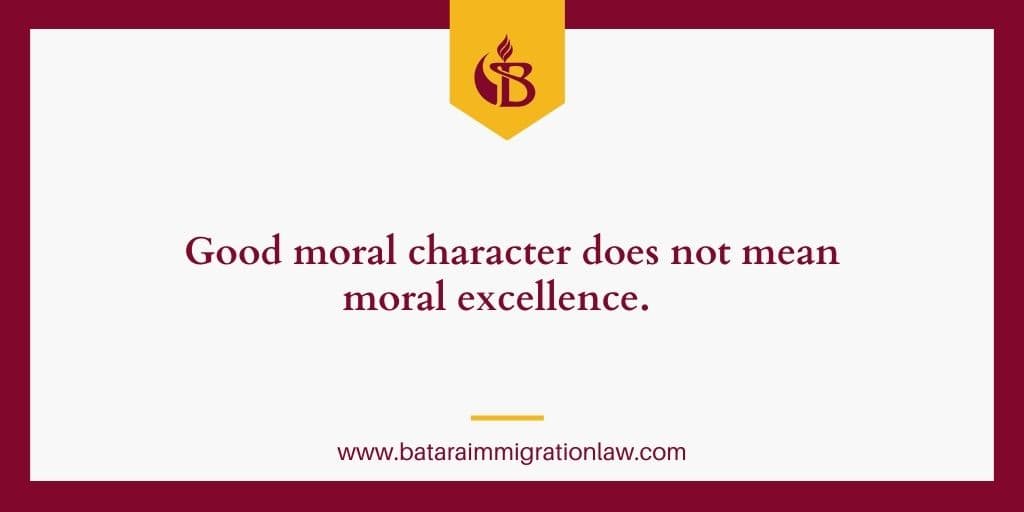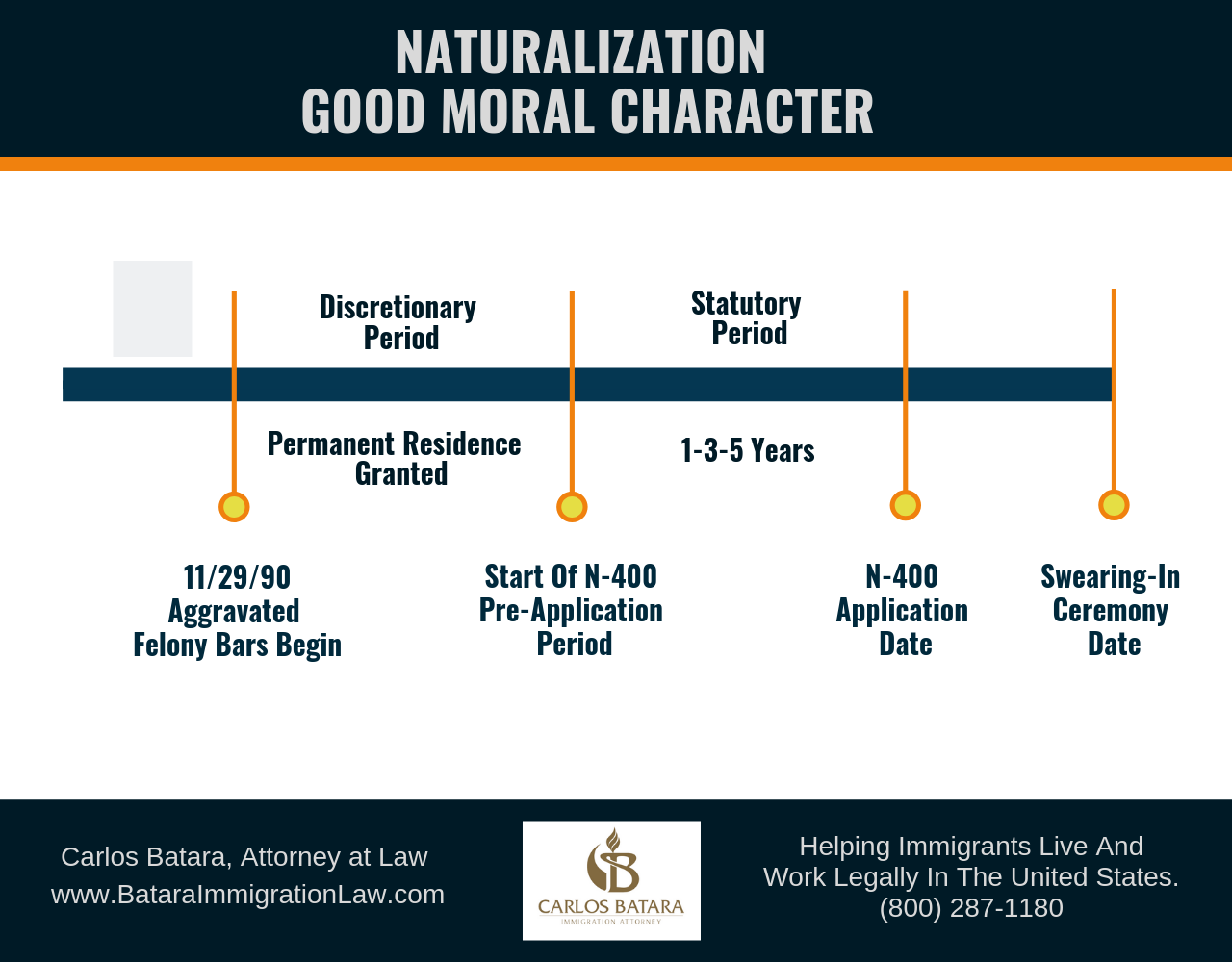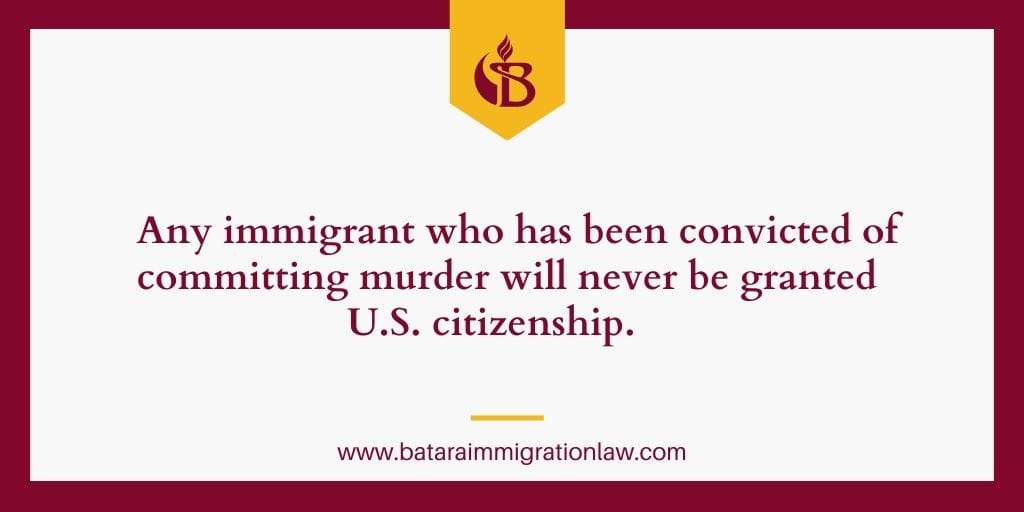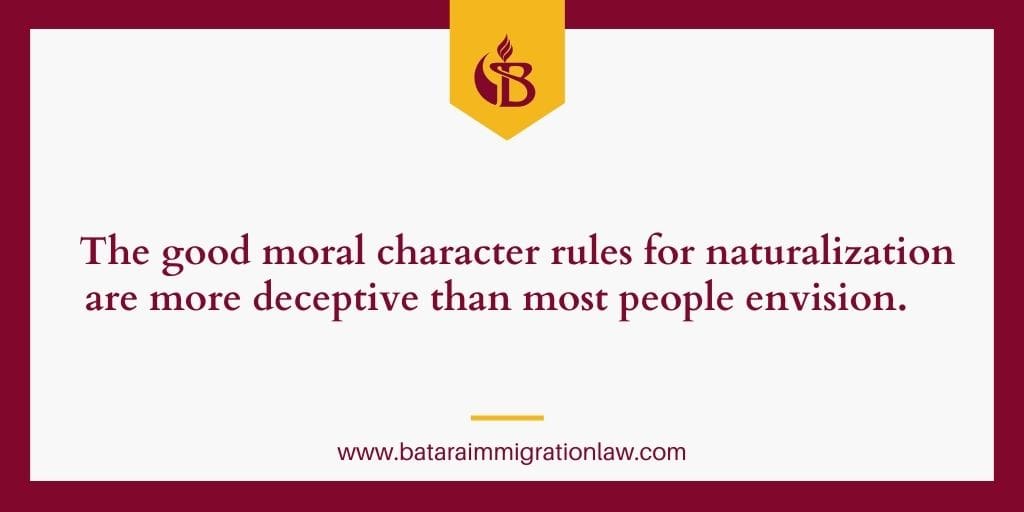
As a citizenship lawyer, I’ve met many permanent residents who take the naturalization process too lightly.
They assume, “I’ve been a green card holder for five years, and I don’t have any arrests or convictions during that time, why should I worry?”
Such blind confidence is unfounded.
It can lead to wasted time, forfeited fees, negative outcomes, and, in some situations, being placed in deportation proceedings.
Five years of permanent resident status, without criminal blemishes, is no guarantee of naturalization success.
Immigration law is far more complex.
In this article, I share four reasons this attitude is misplaced:
- First, all of immigration law is concerned with rewarding individuals who possess good moral character. The meaning of good moral character is broader than a mere recital of criminal convictions.
- Second, naturalization requirements allow a review of an applicant’s behavior not just in the few years prior to applying for citizenship, but also way beyond such a limited time period.
- Third, certain criminal acts, whenever committed, can preclude naturalization applicants from ever becoming a United States citizen.
- Fourth, other bad acts, not crimes per se, can stymie and defeat the efforts of lawful permanent residents to win naturalization benefits.
Table Of Contents
- A Brief Overview Of Good Moral Character In Naturalization Law
- What Is Good Moral Character?
- What Is The Statutory Period For Naturalization Cases?
- Permanent Bars To Proving Good Moral Character For Citizenship
- Crimes Of Violence And Drug Offenses
- Imprisonment For One Year Or Longer
- Theft Violations
- Conditional Bars To Proving Good Moral Character For Citizenship
- Failure To Pay Court-Ordered Child Support
- Failure To Complete Probation Or Parole Requirements
- Failure To Pay Taxes Or File Honest Tax Returns
- Fraudulent Receipt Of Public Government Assistance
- Providing False Testimony For Immigration Benefits
- Committing Adultery That Destroyed An Existing Marriage
- Moral Perfection Is Not Required, But Do What’s Right And Citizenship Is Yours
A Brief Overview Of Good Moral Character In Naturalization Law
Along the path to United States citizenship, applicants need to be cautious about various potential pitfalls. In particular, good moral character warrants prudent vigilance.
There are two ways naturalization candidates can lose their cases for lacking good moral character.
Applicants can be statutorily denied, which means they’ve committed an act that is listed as a disqualifying factor under citizenship law. Most, but not all, of these acts are related to criminal convictions.
Applicants can also be denied in the government’s discretion. This type of denial means that in the view of USCIS, they have committed “bad” acts – acts which are not automatic disqualifications, yet make them undeserving of approval.
Moreover, for some immigrants, the good moral character requirements could cause a permanent bar to citizenship. Other times, they only create a temporary setback.
Let’s start to explore the intricacies of good moral character there.
Generally speaking, it’s true lawful permanent residents who desire naturalization status need to show they have been persons of good moral character for the requisite period of time set forth in immigration regulations.
That’s the beginning, not the end, of the analysis.
What Is Good Moral Character?
Good moral character for naturalization is character which measures up to the moral standards of average members of the community in which a naturalization applicant resides.
I wouldn’t be surprised if that description leaves you confused. You’re not alone.
There is no statutory definition of what constitutes good moral character.
Hence, the above explanation, provided by the U.S. Citizenship and Immigration Services Policy Manuel, is the official guide for determining good moral character in naturalization cases – even though it sounds like one of those fuzzy subjective “I know it when I see it” legal interpretations.
Despite its broad language used by USCIS, the government does not possess unfettered discretion in assessing good moral character. For as the Board of Immigration Appeals has pointed out in the broader immigration context, “good moral character does not mean moral excellence.”

The BIA perspective, in short, adds a much-needed degree of levity to a legal term open to a near infinite range of discretionary evaluations.
What Is The Statutory Period For Naturalization Cases?
To qualify for naturalization, applicants must prove they have been persons of good moral character throughout a specified number of years prior to filing their applications. This is known as the statutory period.
In general, the pertinent time frame during which naturalization hopefuls must show good moral character is five years before submission of their citizenship paperwork.
This period is reduced to three years for those seeking to naturalize via marriage to United States citizens. (It is further reduced to one year for those serving or having served in the military, as well as persons who fall under other special categories.)
However, in ascertaining whether an immigrant has met the good moral requirements, USCIS is not restricted to reviewing his or her conduct during the 1-3-5 years statutory period.
In other words, some acts, offenses, or convictions, even though they happened before the relevant statutory period, will negatively impact the outcome of naturalization cases. This occurs, for instance, when the government officer discovers an applicant’s record shows a lack of good moral character outside the statutory period and a failure of rehabilitation or change of behavior during the statutory period.
Additionally, individuals pursing naturalization benefits must maintain good moral conduct from the period between filing their N-400 applications to taking the oath of citizenship.

Now that we’ve covered the definition of good moral character and the applicable time frames utilized in analyzing an applicant’s merits for citizenship, we need to discuss the actual bars to naturalization.
As noted earlier, there are two types of bars in naturalization matters: permanent bars and temporary, conditional bars.
We’ll begin with the permanent bars.
Permanent Bars To Proving Good Moral Character For Citizenship
A permanent bar means if an immigrant has committed certain acts, even long before the statutory period in his case, he will be precluded from proving good moral character.
This means, of course, naturalization is beyond reach.
Essentially, permanent bars are crimes classified as aggravated felonies under immigration law.
What constitutes an aggravated felony varies.
Certain convictions are aggravated felonies because they are crimes of violence and drug crimes. Other violations are only aggravated felonies if a sentence of more than one year was imposed. Theft offenses are aggravated felonies depending on the value of what was taken and the sentence imposed. Some examples follow.
Crimes Of Violence And Drug Offenses
Crimes of violence and drug offenses:
- Murder, rape, sexual abuse of a minor
- Drug offenses and drug trafficking
- Trafficking in firearms or destructive devices
Imprisonment For One Year Or Longer
Convictions of acts for which the term of imprisonment was at least one year:
- A crime of violence
- Theft, receipt of stolen property, or burglary
- Using or creating false documents
- Obstruction of justice, bribery of a witness, or perjury
Theft Convictions
The list of disqualifying theft violations include:
- Money laundering and monetary transactions from illegally derived funds
- Fraud, deceit, or tax evasion if the amount exceeds $10,000
There is one significant caveat for naturalization aspirants who committed one of these crimes several decades ago.
If the conviction for an aggravated felony took place before November 29, 1990, that crime does not automatically bar person is not permanently barred from establishing good moral character.
Except for murder.
Stated simply, any immigrant who has been convicted of committing murder will never be granted U.S. citizenship.

This does not mean that applicants whose aggravated felony conviction happened prior to November 29, 1990 are off the hook. Rather, as noted above, this is the type of situation where USCIS officials will evaluate applicants’ old convictions vis-a-vis current signals of their moral character.
Conditional Bars To Proving Good Moral Character For Citizenship
We now turn our attention to conditional bars.
Like the permanent bars to good moral character, immigration regulations include a list of conditional bars – bars that are triggered by acts, offenses, activities, circumstances, or convictions committed by naturalization seekers – within their statutory periods, as well during the period prior to filing and up to the time of the Oath of Allegiance.
These bars, similar to the permanent bars, can disqualify a person from naturalization on the absence of good moral character.
But unlike the permanent bars to naturalization, conditional bars can be cured in many situations. In brief, despite compelling an adverse decision during the relevant statutory period, a petitioner can try again at a later date to achieve citizenship status.
During my tenure as an immigration lawyer in San Bernardino, I have consulted with more permanent residents who have been tripped up by problems with conditional bars than by problems due to obstacles imposed by permanent bars.
The reason, it seems, is straight-forward. Whereas the permanent bar issues, many of them serious crimes, place individuals on alert before applying for immigration benefits, conditional bar pitfalls are often unsuspected.
And this is a huge reason why many folks who assert that all they have to do to become citizens is to avoid convictions for five years wind up with naturalization denials.
So let’s explore some of these less-known reasons:
- Failure to pay court-ordered child support
- Failure to complete probation or parole requirements
- Failure to pay taxes or file honest tax returns
- Fraudulent receipt of public government assistance
- Providing false testimony for immigration benefits
- Committing adultery that destroyed an existing marriage
Failure To Pay Court-Ordered Child Support
If you have failed to pay child support, pursuant to a court order, you may be barred from becoming a U.S. citizen. The key is that your refusal must be “willful” and deliberate. For example, if you stopped making payments because you have been unemployed or current debts like medical emergencies hindered your ability to comply, then the government may excuse your child support history if you can demonstrate solid proof of your circumstances.
Failure To Complete Probation
Or Parole Requirements
If you have not completed your probation or parole requirements at the time of your naturalization interview, your application will be denied.
Sometimes, the error is due to simple oversight. The crime may have taken place over ten years ago. It won’t matter. Your application will be denied.
Since the N-400 naturalization application asks for both proof of your convictions and completion of probation or parole provisions, this type of mistake should never occur.
But they happen, usually under one of three scenarios.
The person assisting you dropped the ball and prepared a faulty application on your behalf, absent any evidence of probation or parole compliance. I have seen this type of oversight most often in the context of paperwork prepared by individuals on their own without legal guidance, or prepared by paralegals, legal assistants, notarios, or family members.
Other times, this problem arises when applicants have stopped adhering to the conditions of probation or parole, such as making regular restitution payments or attending anger management courses. To think that the government will excuse such a mindset is pure folly.
Thirdly, some folks are simply unaware that they have violated their conditions of probation of parole. How might this happen?
It is not uncommon for individuals, when they are arrested, to want to avoid appearing at court. As such, they are more than elated when they hire defense counsel who tells them it’s okay not to go to court because they will work out the plea bargain.
At the hearing, the lawyer works reaches agreement with the prosecutor, and then informs the immigration client. In some cases, the attorney explains the conditions of probation or parole, but the client does not fully understand the conditions. Or does not pay attention to them. In either event, the individual overlooks fulfilling the conviction deal requirements.
What happens next can be devastating.
The applicant appears for their interview and is told he or she has an existing warrant for failing to fulfill the probation or parole conditions. Hence, not only is the individual’s citizenship application denied, but also the person is taken into custody by a local law enforcement officer.
In worst case scenarios, such cases can be referred to immigration court to begin deportation proceedings against the naturalization applicant.
Failure To Pay Income Taxes
Or File Honest Tax Returns
Sometimes individuals visit my office to discuss naturalization and I notice they have not paid their taxes for the last couple of years. Well, paying your income taxes and filing a truthful tax return is an obligation that, if not fulfilled, will lead to a denied application.
To the extent that tax returns previously filed are inaccurate, if not fraudulent, you should consult with a tax attorney – and pay any back taxes owed – before submitting your N-400 application.
Tax evasion, after all, is a crime. The consequences of not handling your tax situation properly could lead to consequences more damaging than a mere denial of naturalization status.
Acceptance Of Government Assistance Under False Pretenses
This is the public charge issue. In recent months, as part of its anti-citizenship agenda, the government has indicated that it plans to crack down on individuals using public benefits.
Much of the media hoopla on this matter has centered on the general usage of public benefits by immigrants. For naturalization purposes, the statutory focus is on the fraudulent receipt of government assistance.
In particular, this means that if you have ever purposely misled government agencies in order to receive welfare, disability, food stamps, or other types of benefits, your application for naturalization is doomed.
Plus, like many of the other conditional bar infractions, the possibility of both criminal and deportation charges linger in the background for offenders.
Providing False Testimony To Procure Immigration Benefits
Akin to seeking public benefits via false pretenses,if you give false testimony with the intention of obtaining immigration benefits, you could face adverse immigration and crime repercussions.
Legally speaking, such testimony must be made orally and under oath. As a result, if you provide misleading information in an application or fraudulent documents to USCIS, this does not constitute false testimony for purposes of a N-400 denial based on good moral character.
However, at your interview, you will be asked to attest to the veracity of the answers you submitted in your written application. The affirmation is false testimony.
Again, the end result may be a finding of lack of good moral character, a denial of your naturalization application, and perhaps referral to local police, sheriff, or immigration law enforcement agencies for potential prosecutorial proceedings.
Here are two examples. The first comes from my daily immigration law practice.
A few weeks back, a gentlemen visited my office to discuss his failure to disclose that he had smuggled a person nearly 15 years ago. When I asked him if he had ever brought anyone across the border, he stated that the only person without legal papers he had ever picked up and helped enter the U.S. was his sister’s son, then a small child. He did not reveal that on his application.
He mentioned that the interviewing officer asked him a few times about his nephew. He maintained his innocence. As we talked about his denial in more depth, I learned his nephew was approved for the Deferred Action for Childhood Arrivals (DACA) program.
I inquired if his nephew’s DACA application had informed the government how he had been brought to the country. The gentleman did not know. I suspect it did.
In a publicized matter, it was reported a 63-year old woman living in Florida was placed in denaturalization proceedings because she had participated in a fraud scheme during the early 2000’s. The woman had worked as a secretary for a company where she prepared paperwork under instructions from her boss. He pocketed money from these applications based on fraud.
The woman successfully applied for naturalization in 2007. She was arrested two years later, in 2009, for her role in the fraud. Asserting she had misrepresented facts in her N-400 application, law enforcement officers took her into custody. She pled guilty in 2012.
According to USCIS, in 2007, she falsely answered the N-400 question which asks, “Have you ever committed, assisted in committing, or attempted to commit, a crime or offense for which you were not arrested?” In the view of the agency, she was part of a conspiracy in 2007 and she did not tell the truth in order to obtain citizenship status.
Involvement In An Extramarital Relationship That Tended To Destroy A Marriage
This may be one of the least known bars to naturalization success but it is sometimes easy for a USCIS agent to spot.
For instance, perhaps you married a U.S. citizen, who then filed for you to obtain a green card. Your spouse was divorced for two months before you married her. She gave birth to your son about four months earlier, but only separated from her former husband 10 months ago.
This indicates she was likely three months pregnant at the time of her separation.
Absent extenuating circumstances, the reviewing officer may perceive such behavior as a blemish on your worthiness for citizenship and deny your application.
Here’s the takeaway. The good moral character rules for naturalization are more deceptive than most people envision.

Moral Perfection Is Not Required, But Do What’s Right And Citizenship Is Yours
The discussion above is not exhaustive on the topic of bars to citizenship.
Although the discussion above covers the most common stumbling blocks I see in my practice, there are plenty more hurdles lurking in the immigration bushes.
Yet, by now, I hope you realize the mantra, “I’ve been a green card holder for five years, and I don’t have any arrests or convictions during that time, why should I worry?” is an ill-advised formula for naturalization success.
To recap, there are four primary reasons why this viewpoint is flawed:
- First, all of immigration law is concerned with rewarding individuals who possess good moral character. The meaning of good moral character is broader than a mere recital of criminal convictions.
- Second, naturalization requirements allow a review of an applicant’s behavior not just in the few years prior to applying for citizenship, but also way beyond such a limited time period.
- Third, certain criminal acts, whenever committed, can preclude naturalization applicants from ever becoming a United States citizen.
- Fourth, other bad acts, not crimes per se, can stymie and defeat the efforts of lawful permanent residents to win naturalization benefits.
If you take these four insights to heart, your journey to citizenship won’t be derailed or transformed into a deportation nightmare.
And you won’t. Unlike those who walked into my office after experiencing an excruciating defeat, you’ve taken the time to arm yourself with the knowledge and insights to uncover the truth about the naturalization process.
You understand if a little detour is needed to ensure success is ultimately yours. If it is, you’ll take it. You’ll clean up what needs to be cleaned up. You’ll fix what needs to be fixed.
You’ll do what’s right.
For yourself. Your spouse. Your family.
That’s how citizenship is earned.
Ready to take a serious and honest look at the strengths and weaknesses of your immigration case? Let’s get started with a personalized strategy and planning session . . .




